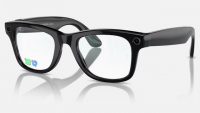Underscoring its commitment to smart glasses, Meta Platforms has reportedly invested $3.5 billion in EssilorLuxottica SA, the world’s largest manufacturer of eyewear. The move gives Meta around a three percent stake in the Paris-headquartered firm, and expands an existing relationship for brand deals that resulted in the casual Ray-Ban Meta AI glasses released in 2021 and an athlete-focused Oakley Meta HSTN AI line announced last month. Neither Meta nor EssilorLuxottica has publicly commented on the equity buy-in yet, though it has been reported Meta may increase its stake to five percent.
“The deal aligns with Meta CEO Mark Zuckerberg’s commitment to AI and gives Meta the advantage of having more detailed manufacturing knowledge and global distribution networks, fundamental to turning its smart glasses into mass-market products,” writes Bloomberg.

MarketWatch says the new partnership affords Meta “the opportunity to build its own hardware and control its own distribution.”
The Ray-Ban Meta glasses currently sell for around $300 and feature “built-in cameras and an AI assistant that provide image-captioning or real-time stock prices,” Bloomberg notes. Earlier this year the company announced it was developing a third-generation series that responds to hand gestures and has a built-in screen and could carry a list price of up to $1,400.
The Oakley Meta HSTN glasses, which support 3K video recording and 8 hours of battery life, start at $400 and will be dropping later this summer.
In the two-years that Meta has been working with EssilorLuxottica it has sold two million smart glasses, and “plans to increase capacity to ten million pairs by the end of 2026,” according to MarketWatch.
EssilorLuxottica stock climbed as much as 7.1 percent Wednesday on news of Meta’s buy-in giving the company a market value of just over $137 billion, according to Bloomberg, which says competing eyewear manufacturer Warby Parker also got a bump from the news, shares climbing 4.5 percent. Google recently showcased smart glasses made with Warby Parker.
Smart glasses are having a moment. Another tech company interested in eyewear is Snap, which last month unveiled plans for Specs, a “lightweight, immersible” consumer line of AR smart glasses. And in June, Beijing-based tech firm Xiaomi also entered the space.
“Last year sales of smart glasses reached $6 billion, according to Precedence Research, which forecasts the market to expand to $16 billion by 2034,” reports MarketWatch.

No Comments Yet
You can be the first to comment!
Leave a comment
You must be logged in to post a comment.